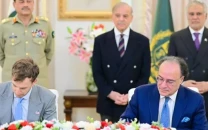Who will be good for Pakistan?
Pakistan will find neither Republicans nor Democrats loving it too much in these post-Cold War days of tight money.

Who will be good for Pakistan?
It is, perhaps, wrong to revise history and dump the Republicans because they have been supporting Pakistani dictators at the cost of Pakistan’s democratic institutions. This thinking presumes that if the US had not helped Pakistan against India, Pakistan’s democracy would have flourished. This distorts the established understanding of Pakistan as a state. What actually happened during the Republican administrations was the meeting of two pragmatisms.
The default description of the history of Pakistan-US relations is that Republicans have gone along with Pakistan’s prickly India-centric foreign policy better than the Democrats. The US practises what is called a ‘realistic’ foreign policy emblematised by the slogan ‘there are no permanent friends or enemies’. When Prime Minister Liaquat Ali Khan first visited the US — as Pakistan’s first act of realism after 1947 — he was put off when this motto was pronounced to him. Pakistan never made an intellectual effort to understand the US as a ‘friend’.
American realism is explained by Francis Fukuyama in his book After the Neocons: America at the Crossroads (2007) as “four approaches”: 1) Realism in the tradition of Henry Kissinger that respects power and tends to downplay the internal nature of other regimes and human rights concerns; 2) liberal internationalism that transcends power politics altogether and moves to an international order based on law and institutions; 3) Jacksonian American nationalism that tends to take a narrow, security-related view of American national interests, distrusts multilateralism and tends towards nativism and isolationism in its more extreme manifestation.
Fukuyama gives the following definition to the fourth school of thought: 4) Neoconservatism, which speaks from a moral platform and justifies pre-emption, regime change, unilateralism and benevolent hegemony in foreign policy (p.7).
Pakistan benefited under Reagan and Bush (Republican) and is suffering under President Obama (Democrat) as the Americans make ready to leave Afghanistan. The pattern is historical: Republicans expand; the Democrats contract after an imperial overstretch. Both President Obama and Romney agree that Pakistan cannot be abandoned to its own devices because of the collapse of its internal sovereignty and endangered possession of nuclear weapons. They both favour the use of drones to mellow Pakistan’s honour-based temperament dangerously inclined to favouring Taliban.
Pakistan will find neither the Republicans nor the Democrats loving it too much in these post-Cold War days of tight money. In Washington’s strategy, the generals of the Pentagon have a bigger profile because of the conditions of war on terrorism. This is one reason America’s Pakistan policy will be more bipartisan than in the past. Pakistan, therefore, can hardly choose between the two parties.
Pakistan is up on its hind legs because of its timocracy (rule of honour) but its economy is hurtling downwards. Its foreign policy is unrealistic, based on hurt pride and a passion for revenge. Its policy on Raymond Davis, Osama bin Laden’s death, Ambassador Husain Haqqani and Dr Shakeel Afridi was unrealistic.
Pakistan cannot articulate its foreign policy logically because of its near total incapacity to preserve internal sovereignty. The extremism of its society has brought it close to the identity of the terrorists it doesn’t want to fight.
Published in The Express Tribune, November 4th, 2012.















COMMENTS
Comments are moderated and generally will be posted if they are on-topic and not abusive.
For more information, please see our Comments FAQ